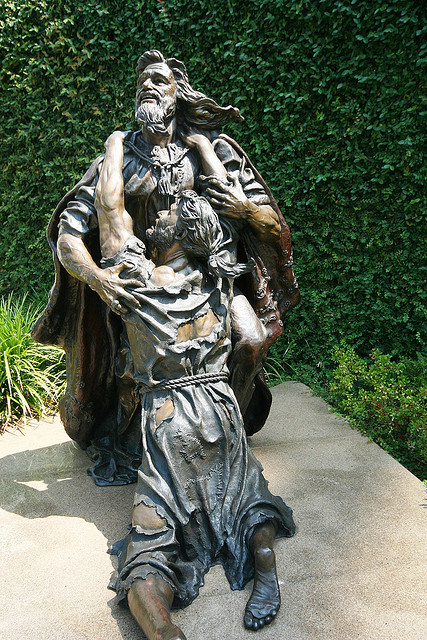God bless Jacob. Not that prayers offer him anything now, but goodwill continually wells up in my bowels for his soul. If ever there was anything you wanted to know about crime and punishment, sin and judgement, condemnation or rehabilitation, and ultimately the true fix and immutability of our estate before the divine, look no further.
His first act while in the womb was to challenge order. His last act, as he blessed the children of Joseph was to defy order. In between he challenged just about every boundary with which culture, morality, decency, even life itself are edged. If you decided to base life lessons on his story, it would most certainly be “how not to live”; yet not only has his legacy endured, his name dominates the world of the arts and sciences, several thousand lifetimes after he walked the earth. Tell me, I pray you, why should I not be in awe?

There are enemies you take on. There are adversaries you don’t want to contemplate having. Either way you mostly get to choose. Not so Jacob. His destiny was announced before his birth, but his position in the womb seemed contrived to deny him his place in time. Those familiar with the refrain: “before you were formed in the womb I knew you” [1]Jeremiah 1:5, know who was messing with Jacob. Jacob grabbing Esau’s heels at the midwife’s was not so much about sibling rivalry. When the angel said to him, “for as a prince hast thou power with God and with men, and hast prevailed”, [2]Genesis 32:28 it was no mere sound bite. Jacob was conceived to fight. He was born to run.
He found an enormously fertile ground for the seeds he sowed. As he deceived his father, his sons deceived him. As he cheated his way into his brothers position, Reuben, his son, stole unto his father’s bed. As he took advantage of the hungry and weary, Laban took advantage of him.
Exegetes have made much of his all-night battle with a mysterious figure. What I have yet to come across is a discourse on why God seemed not in the least troubled by Jacob’s ‘exploits’. How do you deal with one who has just taken advantage of a blind, old man? In the best tradition of all monotheistic faiths, you’ll take him aside and remind him that judgement is real and hell is real and the hottest part of the latter is reserved for people like him, if he did not mend his ways. Surely somebody gave him a ticking off! Well not really. As soon as he fled the crime scene heaven opened for him and the blessings of Abraham were conferred upon him. [3]Genesis 28:10-16 Did I miss something!
It couldn’t be that God was oblivious to his misdemeanours. When lying to his father as to how he got the venison ready so quickly, he got God involved in his lies: “Because the LORD thy God brought it to me”, [4]Genesis 27:20 he said. Ha ha! There you have it. If anything, that was an invitation to divine opprobrium. Scripture is awash with God’s take on such insolence:
“These six things doth the Lord hate: yea, seven are an abomination unto him: A proud look, a lying tongue, and hands that shed innocent blood, An heart that deviseth wicked imaginations, feet that be swift in running to mischief” [5]Proverb 6:16-18
So why didn’t heaven fall?
There are those who ascribe divine immunity to his acts because, as they say, he was on track towards fulfilling prophecy. That is to imply that God couldn’t perfect his own plans without a bit of underhand help. Perish that thought. If the Almighty could reach to the depth of Pharoah’s gaol to uplift Joseph, grant favour to Moses at the palace where death was decreed for his kind, employ a whale to re-order Jonah’s steps, he most certainly didn’t need help from Rebekah and Jacob to work his will. So what was heaven’s take on Jacob’s games? Hard to tell, since there were no direct divine commentaries on them. However, Jacob’s summation of his life to Pharaoh said it all:
“And Jacob said unto Pharaoh, The days of the years of my pilgrimage are an hundred and thirty years: few and evil have the days of the years of my life been, and have not attained unto the days of the years of the life of my fathers in the days of their pilgrimage.” [6]Genesis 47:9
Considering that he carried within himself a blessing that would progressively change the whole world for good, that was a touch cynical; but not unduly. He got more than double for his troubles. He found an enormously fertile ground for the seeds he sowed. As he deceived his father, his sons deceived him. [7]Genesis 37:13-35 As he cheated his way into his brothers position, Reuben, his son, stole unto his father’s bed. [8]Genesis 35:22 As he took advantage of the hungry and weary, [9]Genesis 25:29-33 Laban took advantage of him. [10]Genesis 31:38-41
The prodigal son did not lose his place in his father. He reaped what he sowed all right and that was sufficient comeuppance.
God did not need to go red in the face. He knew as we’ve come to know that what you sow is what you reap. There was no need for castigation, condemnation or rejection; he didn’t need to reserve a space in some eternally tormenting inferno for his son. As scripture said:
“Behold, the righteous shall be recompensed in the earth: much more the wicked and the sinner.” [11]Proverbs 11:31
Rather than a fury of volcanic proportions from the divine, the words of the angel that fought with him offers a strange study of God’s attitude to his flawed children. The angel called him a Prince; not a usurper, deceiver, manipulator, player, or any of several other appellations more suited to his character traits. Despite Jacob’s herculean effort to separate himself from the God that hates all workers of iniquity, [12]Psalm 5:5 he did not lose his place in God. How come?
Jesus’ parable of the prodigal son throws Jacob’s experience into a sharp relief. The young man took his destiny into his own hands and traded his place in his father for the love of the world. Within the ambit of the culture in which that tale was set, you couldn’t get any more defiled than attending to pigs. He knew he was unworthy to return to sonship. He rehearsed his application to become a servant in his father’s house. But he didn’t get to voice his lines. He did’t get to beg or seek forgiveness. His father did not give him that chance. To his amazement and utter consternation of his well, behaved and responsible sibling, his father swept him into a joyous, tearful embrace. The prodigal son did not lose his place in his father. He reaped what he sowed all right and that was sufficient comeuppance.
God’s love, it would seem, is not based on us being on our best behaviour. It is based on the terms of a filial covenant. He said that though we were perpetually inclined towards evil, he would nonetheless remain merciful. As he said:
“If his children forsake my law, and walk not in my judgments; If they break my statutes, and keep not my commandments; Then will I visit their transgression with the rod, and their iniquity with stripes. Nevertheless my lovingkindness will I not utterly take from him, nor suffer my faithfulness to fail. My covenant will I not break, nor alter the thing that is gone out of my lips.” [13]Psalm 89:30-34
I am aware there are alternative scriptures, of course. The story of Lazarus and the rich man is a pulpit favourite for judgement and eternal torment; but that is if read literally. And if we insist on reading it thus then we must consider that the parable gave no more on the values of the characters in question other than one was rich and the other was poor. We therefore have no other clue to work with than to conclude that all the rich (irrespective of their contribution to world good), for no other reason than being rich and having a good life, are toast. Conversely, gun-totting, mass-murderers in some famished part of the world will end up in Abraham’s bosom for no other reason than being poor. Ridiculous? You bet. The parable challenges us to be more discerning in the way we read scripture. But I’ll leave that till another day.
It never ceases to amaze me that the last time God condemned a sinful world and saved the righteous, he regretted his actions. How strange that the world has bought into visions that said God would go back on His word and do that which he said he would not repeat!
There is also a fascination with the end time and it’s visions of hydra-headed monsters and Dante’s Peak, an implacably furious, untamably wild, bottomless oven for sinners. I rather take the route of those at the Church in Berea who viewed new teachings in the light of established scripture. [14]Acts 17:11 How does God’s eternal fury with the sinful sit with the notion of him as one whose anger endure but a moment? [15]Psalm 30:5 It never ceases to amaze me that the last time God condemned a sinful world and saved the righteous, he regretted his actions. [16] Genesis 8:21 How strange that the world has bought into visions that said God would go back on His word and do that which he said he would not repeat!
St Paul said love:
“Beareth all things, believeth all things, hopeth all things, endureth all things. Love never faileth” [17]1Corinthians 13:7-8
If God is love, as we are told, then visions of eternal rejection are incompatible with his nature. As the Psalmist wrote,“O give thanks unto the Lord for he is good because his love endures forever.” [18]Psalm 136:1
Scripture cannot be broken. [19]John 10:35
References
| ↑1 | Jeremiah 1:5 |
|---|---|
| ↑2 | Genesis 32:28 |
| ↑3 | Genesis 28:10-16 |
| ↑4 | Genesis 27:20 |
| ↑5 | Proverb 6:16-18 |
| ↑6 | Genesis 47:9 |
| ↑7 | Genesis 37:13-35 |
| ↑8 | Genesis 35:22 |
| ↑9 | Genesis 25:29-33 |
| ↑10 | Genesis 31:38-41 |
| ↑11 | Proverbs 11:31 |
| ↑12 | Psalm 5:5 |
| ↑13 | Psalm 89:30-34 |
| ↑14 | Acts 17:11 |
| ↑15 | Psalm 30:5 |
| ↑16 | Genesis 8:21 |
| ↑17 | 1Corinthians 13:7-8 |
| ↑18 | Psalm 136:1 |
| ↑19 | John 10:35 |


